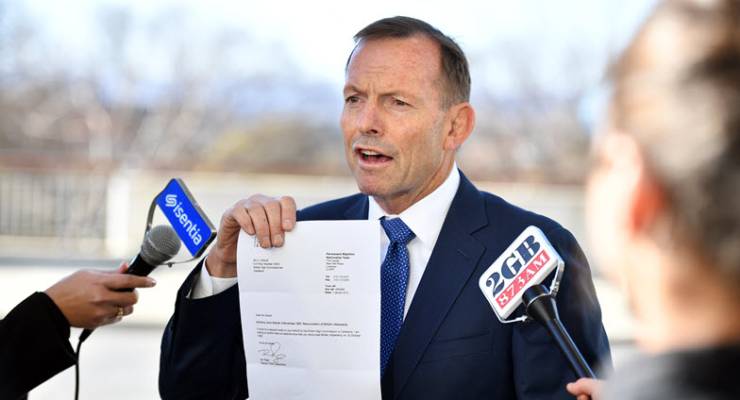
The default position for anyone observing this government must surely be slow, repeated banging of one’s head on one’s desk.
Yesterday began with the Prime Minister reaching for statesman status, talking in very serious terms about the North Korean situation. And rightly so — both in terms of the very great danger to the region from a possible conflict, and politically, because the government needs to be seen to be focusing on important issues, not its own navel. And he cleverly contrasted it with speculation that Labor would cause chaos in Parliament over Deputy PM Barnaby Joyce’s citizenship.
“That at a time when we’re facing the greatest threat of war on the Korean Peninsula in 60 years — more than 60 years — in the face of that, in the face of rising energy prices and Labor’s admitted responsibility for that — in the face of all of that, what the Labor Party wants to do is talk about creating disruption on the floor of the Parliament. Australian’s will be sickened by the sight of the Labor Party’s failure to recognise the priorities of the Australian Parliament is to keep Australians safe and to support the opportunity, the economic opportunity that Australians deserve. That requires the Parliament to focus on the real issues, rather than playing political games.”
But Tony Abbott promptly tried to derail that strategy a short time later by rocking up to “doors” at Parliament House, waving his own piece of paper declaring he was no longer a Brit, and demanding Shorten do the same, that he should “shut up” about Barnaby Joyce otherwise.
So, would the government “play political games” or try to stay statesmanlike? Would it continue the approach of Finance Minister Mathias Cormann, who weeks ago declared Shorten wasn’t a dual citizen, or follow Abbott? Barnaby Joyce, who emerged from what is, by his standards, a period of relative quiet to hold a press conference, was pressed about it but tried to avoid saying one way or the other.
As it turned out, Abbott’s derailment attempt was successful. In question time, the Prime Minister ditched the Churchillian stuff and went after Shorten.
“[T]here is one opinion that every Australian has and that is that the Leader of the Opposition cannot be trusted. The one thing we know is that he claims to have renounced his UK citizenship. Where’s the proof? Where’s the evidence? He won’t show it. All he has to do is produce a piece of paper—that’s all he’s got to do. What is he trying to cover up? … He’s had a test. He could have put the paper on the table and everyone would know, but he’s failed that test. The question Australians are asking is, ‘What has he got to hide?'”
Around 45 minutes later, Shorten tabled his citizenship letter. Turns out, he had nothing to hide. The government had ditched the chance to look like it was interested in something other than its ongoing effort to destroy Bill Shorten for naught — a strategy that, as yesterday’s Newspoll illustrated, leads at best to both Shorten and Turnbull looking unappealing to voters. None of the earnest Dixers about North Korea made the evening news — that was all about the government trying to catch out Shorten. It might not have exactly been a Labor trap, but the government seemed to go out of its way to make it look like one. And none of the “Shorten forced to table document” rendering from some journalists obscured it.
The military maxim that a bad plan executed well is better than a good plan executed badly is relevant here, with the addition that it’s a good idea not to swap between them halfway either. And it’s certainly not a good idea to follow the plans laid down by the bloke on your own side who wants nothing more than to see you fail.








Turnbull’ rhetoric about keeping Australia safe would have more resonance if (a) it wasn’t being done as an American lapdog; (b) it wasn’t done at the expense of a further erosion of what few liberties we actually have; and (c) it didn’t actually increase the very real risk that we become a prime target ourselves in the process.
All Australians know that Turnbull can be truted…to be weak-kneed and lily-livered.
I refer you back to Le Fievre’s brilliant cartoon showing Turnbull caught in the wrong part of town
All Australians know that Turnbull can be trusted…to be weak-kneed and lily-livered.
I refer you back to Le Fievre’s brilliant cartoon showing Turnbull caught in the wrong part of town.
Leon – I rather liked the thought of Talcum being ‘truted’. He has nothing else going for him.
Until yesterday Turnbull was unable to force Shorten’s hand but the cunning latrine rodent, Abbott, set it up neatly. The great irony being how Abbott refused to show his own British citizenship denial letter for years – but now purporting it to be offensive that Shorten wouldn’t cooperate. Shorten has obviously been sitting on this document with intent to display it to maximum effect at the ideal time. He played it well.
Like watching a tug-of-war : when one side let’s go and watches the right fall on it’s arse.
s.